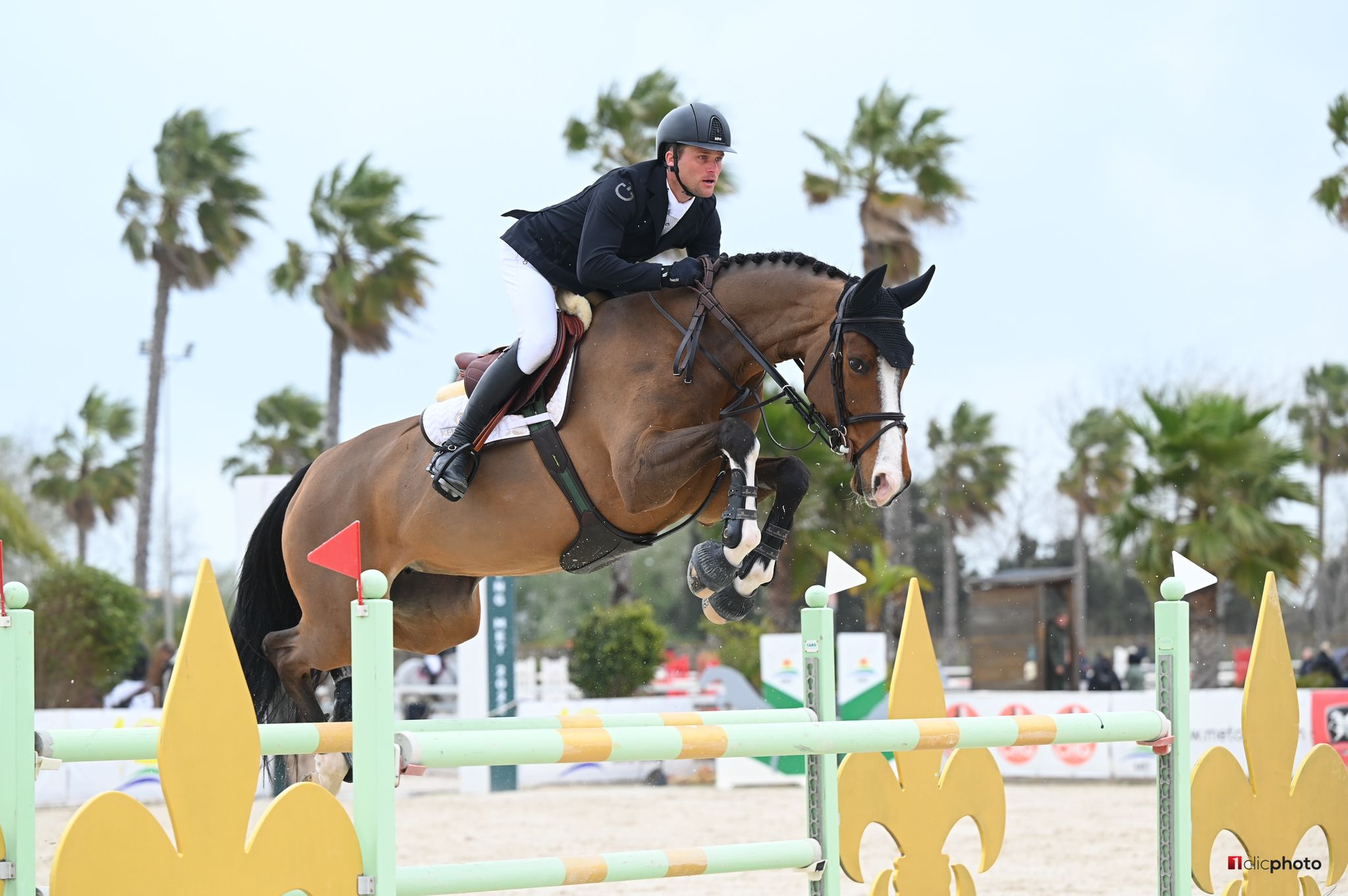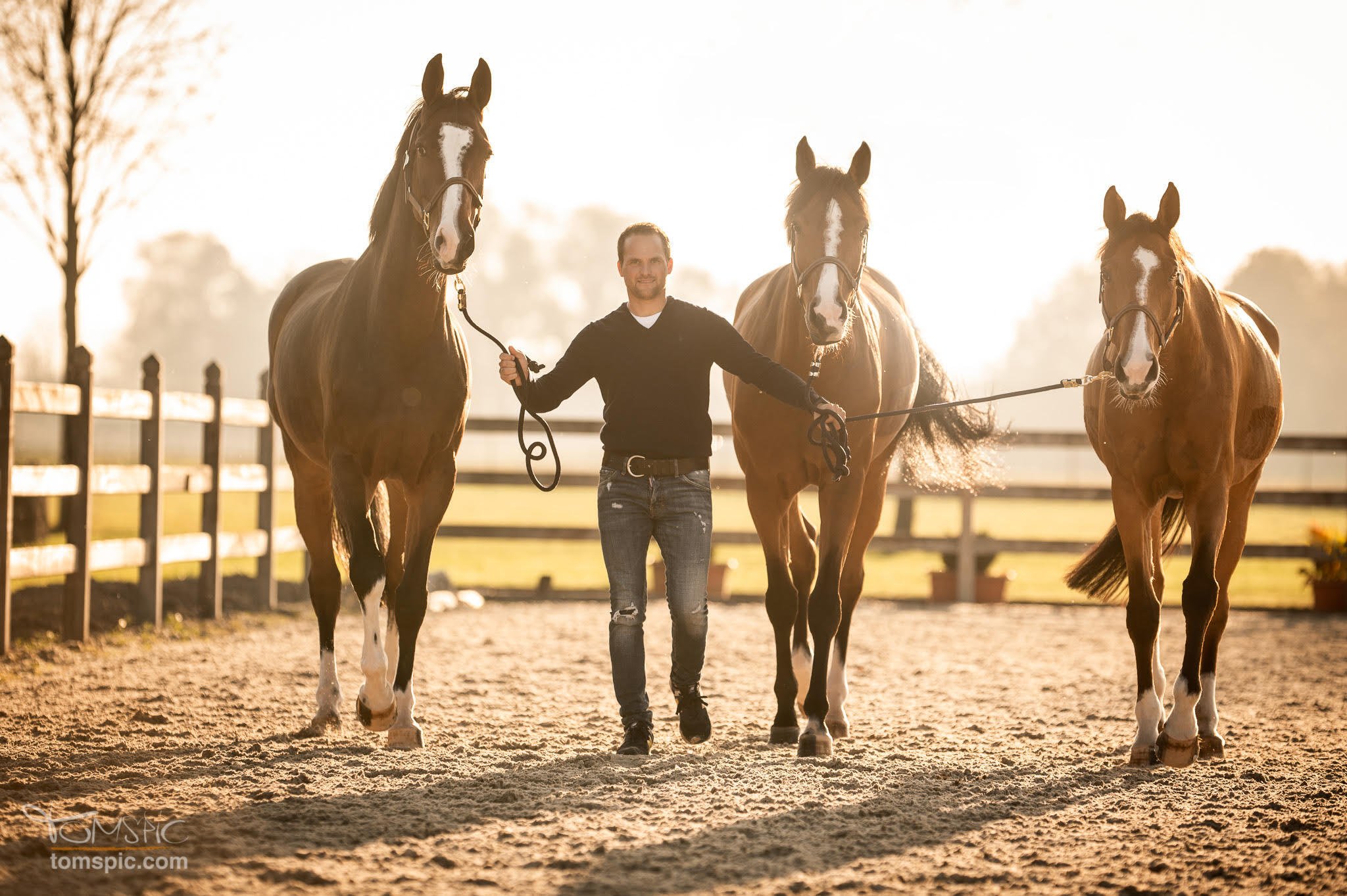4 tips for relaxed horses from Olympic rider Tinne Vilhelmson-Silfven
4 min. read time
Audio version – listen to this article easily
Alexander Schill is a Nations Cup rider, trainer, father, and above all passionate about the well-being of his horses. For him, their gastric health takes top priority. In the following interview you can read what caused his sensitivity for stomach ulcers has and how he optimizes the feeding of his horses as a preventive measure.
“Well, to be honest, I was fortunate never to have had a horse with diagnosable gastric ulcers, because I always take precautions, or work towards that. Competition horses are always under a certain amount of stress. This was especially noticeable in 2020, when we went for three months without a single show due to the pandemic. The horses, being at home in their usual environment, could relax completely. Many horses get stressed from competitive sports, especially from all the travel.”
“We feed our horses Regul Digest from Lambey. We mix it into our concentrate feed. This gives their stomachs some gentle protection. It creates a solid dietary foundation from the very beginning, especially with the young horses that come to us after being broken in. We aim to prevent stomach problems like gastric ulcers and gastritis from occurring in the first place.”
“I would especially recommend Equine 74 Gastric to riders who have tried everything for a horse with gastric ulcers, and so far nothing has helped.”
“I’ve always been interested in the subject and I used to ride a horse that was quite stressed. This horse was especially tense during girthing and showed stressful behavior. I was told that the cause may lie in his stomach. So we gave him (a medicine containing the active ingredient omeprazole), and he changed immediately. He became noticeably calmer and more relaxed.”
“This happened 6 years ago, and after that I decided to pay more attention to gastric health. After all, we riders demand top performance from our horses, so it’s our job to make sure that they feel good. I care a great deal about equestrian sport, and I don’t mind giving out a few euros more for prevention through feed. Along with our feed mix, I also support my horses’ gastric health with Equine 74 Gastric.”

“Our sport horses are turned out in the mornings. They also get exercise 3 to 4 times a day, either hacks or in the horse walker or from being ridden. When they’re in the barn at night, we make especially sure that they all have enough hay on hand. I’ll reduce the concentrate feed before I take away their hay. Naturally a certain energy requirement must be met, but we don’t skimp on forage. If a horse likes to scatter his hay around in his box, we give him a full hay net.”
“Yes. I think that our horses are quite well-balanced. We notice this particularly when handling them, since the horses do in-hand work several times a day and are exercised regularly, and they appear to be at ease. It’s also good for us to have well-balanced horses: everyone can take any horse in-hand; that’s also because we have a good staff, of course. I’m lucky to have such a terrific team.”
“I think it’s extremely important. Your horse’s stomach should be your top priority!”
“We try to take them out just as often as we do at home. Before the test, when they’re already plaited and tension is high, we give them a quiet moment in the box or let them graze in hand. Of course, a little tension before a test is good, and most horses benefit from it. But horses shouldn’t be under stress. We try to stick to the horse’s routine, especially before a Grand Prix. Horses find security in keeping to a routine. I’ll ride in the morning, then they’ll walk a bit on the lead, and then we go into the arena.”

“At the Holsteiner licensing, I overheard a conversation where a horse owner was raving about the changes in her horse after giving him Equine 74 Gastric. Christian Dietz then told me more about it, and I was interested and wanted to try it out right away.”
“I’ve given my spooky horses Equine 74 Gastric and also Equine 74 (Stomach) Calm Relax, and I’ve noticed that they relax more quickly. Mares, especially, are often stressed. With them, I see that the recovery phase is shorter and they’re back into work more quickly. They simply feel better. Also, my horses like to eat it; some prefer the pellets, others prefer the granules. I also like that this supplement is made from natural ingredients and contains no chemicals.”
“I have administered Equine 74 (Stomach) Calm Relax Paste right before a test, which is when the stress is at its highest and I want my horse to stay focused. And the horses notice it too: here’s something special, something important. You notice a difference right away.”
“To anyone who wants to do something good for their horse. It’s terrific for preventing gastric distress. I think it’s also helpful for young riders. Horses and riders can feed off of each other’s tension, so Equine 74 (Stomach) Calm Relax can be a great help for keeping stress at bay during a show.”
“The goal is to keep the horse as relaxed and composed as he is at home. I would especially recommend it to riders who have tried everything for a horse with gastric ulcers, and so far nothing has helped.”
“They’ll see that positive effects are possible without the administration of medications. I recommended Equine 74 Gastric to one of my pupils, and she too has seen a big difference. She had been using some expensive gastric aid product. Now she uses Equine Gastric 74.”
Prevention is the keyword when it comes to stomach ulcers in horses. Not only are stomach ulcers costly and time-consuming for you, but your horse also suffers from pain when it has stomach ulcers. Here you can learn how to prevent them effectively.
Equine 74 Gastric
Buffers the excess acid in the horse's stomach instead of blocking it.
Equine 74 Stomach Calm Relax
Supports the nervous horse stomach in stressful situations.